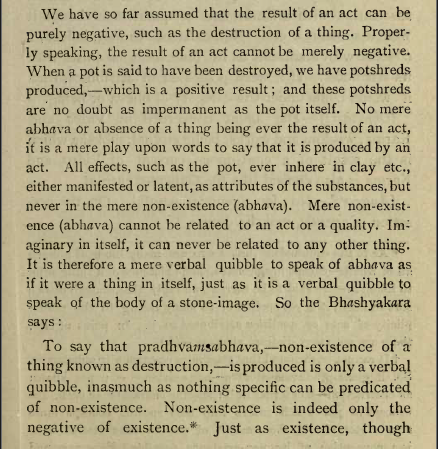Namo Buddhaya!
Consider this
Suppose one hears about the meditative attainment of ‘perception of nothingness’.
Consecutively he becomes resolved on that attainment, he imagines & contemplates how it’d feel to be in such concentration of awareness as to perceive ‘There is nothing’.
Eventually at one time, when there is an opening the man attains a concentration of awareness based on the formless base of nothingness.
He is at that time not percipient of bodily senses, nor his contemplations, nor is he imagining & reflecting on that attainment, nor is he percipient thus ‘space is boundless’ nor like this ‘consciousness is boundless’, rather he is at that time percipient thus ‘There is nothing’.
If you ask him what were you percipience of at that time, he should say 'At that time i was percipient thus ‘There is nothing’.
The op text has the same linguistic structure.
Therefore the statement
At that time i was percipient thus ‘Cessation of existence is extinguishment’
Ought to be treated like one would the statement 'At that time i was percipient thus ‘There is nothing’.
It’d be a mistake to assert that the statement "At that time i was percipient thus ‘There is nothing’’ is a reference to one’s contemplations, imaginings & reflection regarding that attainment.
Rather it is a reference to a meditative attainment of concentration samadhi based on the ‘dimension of nothingness’.
Sariputta in turn ia talking about directly knowing that which is not experienced through the allness of the all as in becoming absorbed in dependence on the cessation principle, of which nobody has heard of much
When this was said, Ven. Sandha said to the Blessed One, "But in what way, lord, is the excellent thoroughbred of a man absorbed when he is absorbed dependent neither on earth, liquid, heat, wind, the sphere of the infinitude of space, the sphere of the infinitude of consciousness, the sphere of nothingness, the sphere of neither perception nor non-perception, this world, the next world, nor on whatever is seen, heard, sensed, cognized, attained, sought after, or pondered by the intellect — and yet he is absorbed, so that to this excellent thoroughbred of a man, absorbed in this way, the gods, together with Indra, the Brahmas, & Pajapati, pay homage even from afar:
‘Homage to you, O thoroughbred man.
Homage to you, O superlative man —
you of whom we don’t know even what it is
dependent on which
you’re absorbed.’"
It’s the noble attainment, transcending all feeling states, it is a seeing with wisdom which destroys taints in as far as there are any, and it remains a foremost pleasant abiding for the arahant.
Not all ariya have this attainment. Faith & Dhamma-Followers do not have this attainment but are guaranteed to attain the fruition of sotapatti (verified confidence) based on this. Everybody else has it, the one attained to view, the one freed by faith, the bodily witness, the one released by wisdom, and the one released in both ways, all have it at least once.
For some It begets the question is Sariputta still extraordinarily percipient?
The question doesn’t apply. He will never come back to tell about it. How do i know? Because there is no basis to talk about Sariputta going anywhere or coming back from as we can’t pin the word Sariputta down as something other than that a word.
In as far as sariputta is not without life force we talked about sariputta being percepient ordinarily or otherwise but after final extinguishment there is no ground because all that heap of referable name & form has passed, ceased, it was, is not and won’t be.
The terms was, is, will be, do not apply to the unmade element based on which sariputta attained samadhi such that he was percipient thus ‘cessation of existence is extinguishment’. It is still something that can come into play but the unmade is not sariputta and the unmade doesn’t change because sariputta attained such samadhi.
It is noteworthy that feeling-states are never the same, one can’t feel what another person feels, and you can’t relive exact same feeling, even if it is a meditative attainment. It is a new experience generated everytime as it is replicated.
The cessation attainments are different. It is literally the same not-generated element coming into play here & there, before & after, for one & for another, it is the exact same being percipient thus 'cessation of existence is extinguishment’in a way opposed to how there can’t be two comings into play of the exact same perception ‘red’ or ‘there is nothing’.
If today you enter & emerge from a cessation attainment and tomorrow you do it again, it’d be the exact same ualloyed, unsurmountable, pleasure attained twice and the final extinguishment will entail a coming into play of this pleasure with no sequel arising of name & form.
This is also paradoxical as is normal for what concerns cessation attainments.

